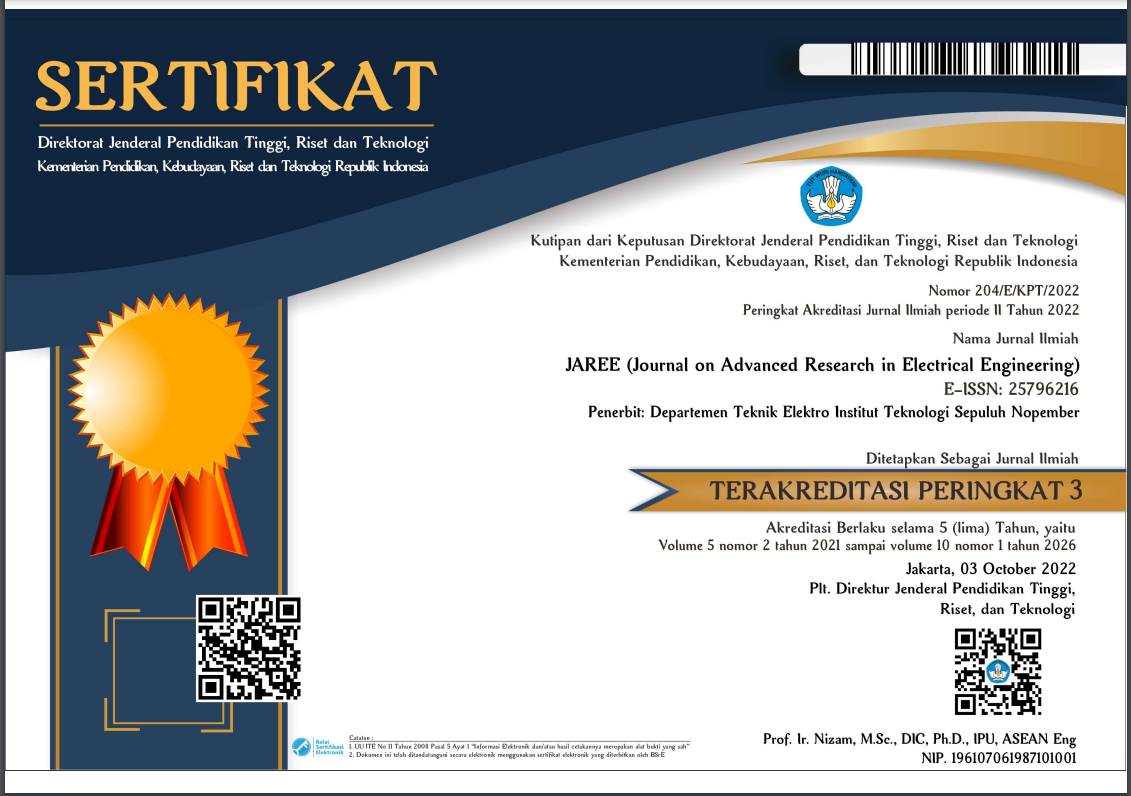Maximum Power Point Tracking Interleaved Boost Converter Using Cuckoo Search Algorithm on The Nano Grid System
DOI:
https://doi.org/10.12962/jaree.v5i1.160Abstract
The problems of using solar panels include the power and efficiency that can be achieved by solar panels during conditions where the surface of the solar panel is covered by shadows, because the performance of the solar panels is affected by the amount of sunlight received and the temperature of the solar panels. Then, a solution appears to overcome the problem, called Maximum Power Point Tracking or a technique to get the maximum output power from solar panels. Initially, MPPT worked with conventional methods, one of which was Perturb and Observe. Furthermore, the MPPT method on solar panels continues to develop to solve problems during partial shade conditions. The development of this conventional method is called the metaheuristic method, an example of which is the Cuckoo Search Algorithm method implemented in this research. This method is characterized by the Levy Flight equation in generating duty cycle values so that it can reach the maximum peak power of solar panels. The system built in this research is also supported by the highly efficient Interleaved Boost converter. Based on simulation results show that the power that can be generated by the MPPT Cuckoo Search Algorithm is higher than the MPPT Perturb and Observe, which is 121.23 W compared to 72.38 W.Keywords: automatic, humidity sensor YL-69, microcontroller, mint leaves, nourishing system, watering system, RTC.References
Trishan Esram and Patrick L. Chapman. “Comparison of Photovoltaic Array Maximum Power Point Tracking Techniquesâ€. IEEE Transaction on Energy Conversion Vol. 22 No. 2 June 2007.
Marcelo Gradella Villalva, Jonas Rafael Gazoli, and Ernesto Ruppert Filho. “Comprehensive Approach to Modeling and Simulation of Photovoltaic Arraysâ€. IEEE Transactions on Power Electronics, Vol. 24, No. 5, May 2009.
Saleh E. Babaa, Georges El Murr, Faisal Mohamed, Srilatha Pamuri. “Overview of Boost Converters for Photovoltaic Systemsâ€. Journal of Power and Energy Engineering Vol. 6 No. 4 April 2018.
Haoyu Wang, Serkan Dusmez, and Alireza Khaligh. “Design and Analysis of a Full-Bridge LLC-Based PEV Charger Optimized for Wide Battery Voltage Rangeâ€. IEEE Transactions on Vehicular Technology 63(4): 1603-1613 May 2014.
Ganta, Mounika, etc. “Simple and Efficient Implementation of Two-Phase Interleaved Boost Converter for Renewable Energy Sourceâ€. International Journal of Emerging Technology and Advanced Engineering Vol. 2 July 2017.
S. Bandri, Zulkarnaini, A. Syofian, A. Effendi. “The Application of Perturb and Observe Algorithm to Optimized of Solar Cell Outputâ€. The 2018 International Conference on Research and Learning of Physics.
Ahmed M. Atallah, Almoataz Y. Abdelaziz, Raihan S. Jumaah. “Implementation of Perturb and Observe MPPT of PV System with Direct Control Method using Buck and Buck-Boost Convertersâ€. Emerging Trends in Electrical, Electronics & Instrumentation Engineering (EEIEJ) Vol. 1 No. 1 February 2014.
Muhammad Kamran, Muhammad Mudassar, Muhammad Rayyan Fazal, Muhammad Usman Asghar, Muhammad Bilal, Rohail Asghar. “Implementation of Improved Perturb & Observe MPPT Technique with Confined Search Space for Standalone Photovoltaic Systemâ€. Journal of King Saud University – Engineering Sciences 32 (2020).
Umashankar Patel, Ms. Dhaneshwari Sahu, Deepkiran Tirkey. “Maximum Power Point Tracking using Perturb & Observe Algorithm and Compare with Another Algorithmâ€. International Journal of Digital Application & Contemporary Reseacrh Vol. 2 Issue 2 September 2013.
Jubaer Ahmed, Zainal Salam. “A Soft Computing MPPT for PV System Based on Cuckoo Search Algorithmâ€. Conference Paper at Conference Power Engineering, Energy and Electrical Drives (POWERENG) 2013.
Mohamed I. Mosaad, M. Osama Abed el-Raouf, Mahmoud A. al-Ahmar, Fahd A. Banakher. “Maximum Power Point Tracking of PV System Based Cuckoo Search Algorithm: Review and Comparisonâ€. Journal Energy Procedia 162 (2019) 117-126.
Ji Ying Shi, Fei Xue, Zi Jian Qin, Wen Zhang, Le Tao Ling, and Ting Yang. “Improved Global Maximum Power Point Tracking for Photovoltaic System via Cuckoo Search under Partial Shaded Conditionâ€. Journal of Power Electronics Vol. 16 No. 1 January 2016.
B. Srinivasa Rao, K. Kiran Kumar, D. Vijaya Kumar. “Design and Simulation of Hybrid System using Cuckoo MPPT Techniqueâ€. International Journal of Engineering and Advanced Technology (IJEAT) Vol. 8 Issue 6 August 2019.
Ahmad A. El Baset A. El Halim, Naggar H. Saad, Ahmed A. El Saffar. “A Comparative Study Between Perturb and Observe and Cuckoo Search Algorithm for Maximum Power Point Trackingâ€. 2019 21st International Middle East Power System Conference (MEPCON) Tanta University Egypt.
Dimas Aji Nugraha, K. L. Lian, Suwarno. “A Novel MPPT Method Based on Cuckoo Search Algorithm and Golden Section Search Algorithm for Partially Shaded PV Systemâ€. Canadian Journal of Electrical and Computer Engineering Vol. 42 No. 3 Summer 2019.








